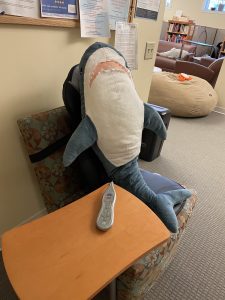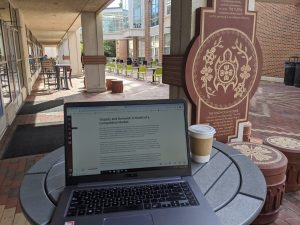Imposter Syndrome
By a Student
“You’re not a writer. Why are you even trying to write this blog post? You don’t deserve to be in the position you’re in. You’re lucky you even got hired; in fact, you’re lucky you even got into this school!”
These questions creep into my mind more often than I’d like, and they’re what went (and are still going through) my head as I’m sitting down to write this post. These negative thoughts stem from my imposter syndrome, or the experience of feeling like a fraud. For example, high-achievers with imposter syndrome are likely to attribute their success to luck, rather than hard work, and feel that any praise they receive is undeserved. The intensity of these experiences varies from person to person, and, while it most often occurs among women and high achievers, anyone can have it.
For me, imposter syndrome describes the internal self-doubt I have in my abilities compared to how others see me. For example, when I used to play soccer, I always felt I was the weakest player on the team. I would beat myself up that I didn’t score, and I felt like I was the reason we had lost games. I feared failing my team so much that I would feel sick up until the first whistle blew. This fear also followed me in my academics. Even though I had always made good grades, I felt like an outsider in my AP classes. My peers would brag about how “easy” these classes were and how they didn’t have to study or take notes, while I felt anxious if I didn’t study for hours on end and review my overly detailed notes. My conscience won’t let me do anything but what is necessary until all my work (including studying) is finished. I often have to force myself to do something relaxing because I feel a pit in my stomach every time I’m doing something “unproductive.” For example, I often have the bad habit of scarfing down my meals because I could use the extra time in a more productive area of my life. I don’t want to live this way, but, at times, it feels like I have no choice.
Being a first-generation college student contributes to the problem. Even though I’ve experienced the symptoms of imposter syndrome in high school, they amplified once I came to UNC. As the son of two people who don’t have college degrees, I felt like I was breaking an unspoken barrier, like I only got into this prestigious university because I was filling a quota. I thought that the pressure of getting in would go away, but I had another hill to climb: getting into business school.
The main reason I came to UNC was for its business program, so I had no idea what I would do if I was not accepted. During my freshman year, when I was a Pre-Business student, I would wake up with a feeling of dread before I set off to class. What if I spend all this time and money just to fail? I felt this way because I had immense pressure on my shoulders; I didn’t want to squander the opportunity I was given by being accepted into UNC, and I had to pass my business prerequisite courses with a high enough grade to even apply to be in my major. Up until I received my acceptance letter from Kenan-Flagler, I had no idea if I had what it took to get in. All I thought to myself to try and make my situation better was, “Well, I tried my best, and that’s all I can do.”
Sadly, I have not fully overcome my imposter syndrome, but I have found ways to live with it. One helpful resource is the UNC Learning Center’s article on managing college stress. While it’s not directly about imposter syndrome, it does point to many good strategies that are transferable. When I read this article, I was reminded that we’re all human. While it may not seem “logical” or “efficient,” leisure is sometimes necessary. As the article says,
“When we are mindful of [our personal] needs and take time to enjoy them,
we are less likely to be stressed.”

I used to be a hermit, barely leaving my room unless it was a necessity. Whenever I would go out with friends, play video games online, or spend time with my family, I never fully enjoyed myself because my imposter syndrome was holding me back. I would always have nagging thoughts in the back of my mind, saying, “You really feel like you should be rewarding yourself? What have you done? You could be getting ahead on your English reading [even though I was already a week ahead].”
After years of feeling this way, I finally put my foot down. I wasn’t going to allow these negative thoughts to rule my life. I made myself promise to try and put myself out there more, to, ironically, fake it ‘till I made it. Now, when a friend asks to go to lunch, hang out on the weekends, or study at Davis together, my answer isn’t immediately “no.” By being more social, I’ve slowly but surely noticed that my anxiety and stress have lessened. For years I had struggled to find a good, healthy balance between school, work, and leisure; now I have more stability between these three aspects of my day.

More recently, I put myself on a lower-calorie diet, increased my protein intake, and started exercising at the SRC whenever I have the time. I wanted to feel more confident, and my friends advised me that exercise and a healthy diet would be great for my mental health. I doubted them at first. I thought to myself, “How does that make any sense? I already barely have personal time with school and work, how am I supposed to add that on?” I pushed myself to try anyway. I cut out soda in exchange for water, gave or threw away all the junk in my room, calculated my recommended daily calorie intake, and started going to the SRC as soon as I got back from Spring Break. The first week was hard. I had pretty bad withdrawal symptoms from Sprite, but, by the third day, water started tasting better. I craved double-stuffed Oreos a ton, but I stayed strong. Now, almost three months later, I feel better than ever. I’ve lost 26 pounds, starting to feel more confident, and realized that, once again, my imposter syndrome was trying to stop me from doing something beneficial. All that said, I still have thoughts of self-doubt, but trying to be more healthy has given me the confidence boost I’ve needed to try and block out those negative thoughts.
While these strategies have worked for me, I acknowledge that not everyone is the same. I do, however, encourage you to get out of your comfort zone and, like my mother always says, “Don’t knock it ‘till you try it!” If you’ve been waiting for a push, here it is. Be the best possible version of yourself and prove those nasty internal thoughts wrong. We’re in this together.
This blog showcases the perspectives of UNC Chapel Hill community members learning and writing online. If you want to talk to a Writing and Learning Center coach about implementing strategies described in the blog, make an appointment with a writing coach, a peer tutor, or an academic coach today. Have an idea for a blog post about how you are learning and writing remotely? Contact us here.

